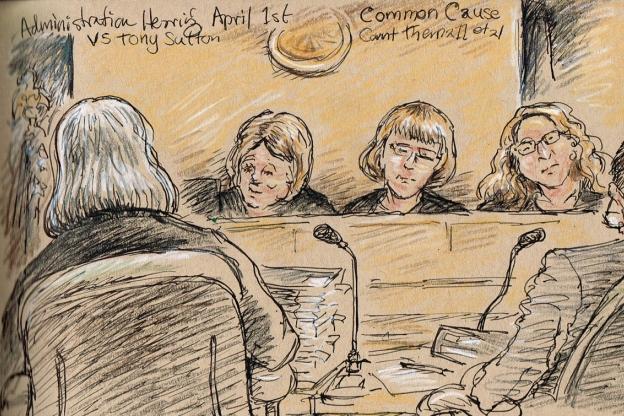

CCM v. RPM: the hearing I
There were final arguments at the Office of Administrative Hearings presented in Common Cause Minnesota v. Republican Party of Minnesota on Monday, April 1, 2013. At the conclusion of the argument, the panel of administrative law judges took the matter under advisement, which is judge speak for “We’ll let you know.” It is the way most hearings end.
The case arises out of the recount activities — or, one might say, shenanigans — of the RPM after the 2010 gubernatorial election that Republican Tom Emmer lost to Mark Dayton. The margin was small enough that an automatic recount was required under law. The battle cry of the RPM, and especially its then chairman, Tony Sutton, was We won’t get rolled again!, referring, of course, to the loss in the Franken/Coleman recount.
The RPM, through Sutton, put three teams of lawyers on the recount immediately, including its long-time general counsel, Tony Trimble, a Washington, D.C. election expert, Michael Toner, and former Minnesota Supreme Court Justice Eric Magnuson, as well as their respective retinues.
By the time Emmer conceded the race in early December, the lawyers had run up a tab of $600,000, a pretty impressive sum, representing a burn rate of about $20,000 a day. Of course, Sutton gagged when he saw the first month’s bills (apparently Trimble had sent some interim bills during the month), especially since they came in right at the time Emmer threw in the towel.
It is very hard to raise money off a corpse (as Sutton later admitted in a deposition before the Campaign Finance Board), and he recognized that he had a problem. Questions were already being raised about his management of the RPM, and this certainly wasn’t going to help. Sutton continued to hang out at the Minneapolis Club trying to raise money — and he did raise some — but the problem just got pushed off, as financial problems often are. There were very few people associated with the RPM who knew of the size of the legal bills, but questions were being asked.
The end of the year passed, and the RPM filed it 2010 year-end report with the Campaign Finance Board at the end of January of 2011, making no mention of the $600,000 debt to the lawyers, even though the services had been contracted by the RPM, the work performed, and the bills rendered to the RPM.
In February of 2011 [the typo “2012” in the original version is corrected here], Sutton announced, in a clearly “covering his tracks” maneuver, that a corporation named “Count Them All Properly” would be used to raise money and pay for the recount. This was problematic, of course, since the recount was really over, and had been for a couple of months. When asked why it was decided to use a separate recount fund at this late date rather than the party as originally announced, Sutton said, “We changed our mind.”
Now, people were really starting to ask questions, since CTAP was formed as a business corporation, not a non-profit, and its first board of directors had some people appointed to it who apparently knew nothing about it. CTAP was not even formed as a corporate entity until a day or two before Emmer conceded, so it could not have retained the lawyers itself. As mentioned, the lawyers had been retained, their work done, and their bills rendered to the RPM months before.
Questions about Tony’s handling of this and other things continued to build and caused his forced resignation in December of 2011.
In January of 2012, Common Cause filed an complaint with the Campaign Finance and Public Disclosure Board alleging multiple financial improprieties and violations of campaign law (including the failure to disclose the debt to the lawyers) by Sutton and the RPM. In extensive findings, the CFB ruled in July of that year that the RPM had engaged in a serious reporting violation over the matter. The RPM was fined $27,000, Tony Sutton was fined $3,000 personally, and CTAP was fined $3,000 for not registering as a campaign organization. You can read the Board’s findings here.
The CFB observed in its findings that there was also an apparent violation of law by use of a for-profit corporation to raise money to pay off the debt of the RPM, but that it couldn’t do anything about it, since that was within the jurisdiction of the Office of Administrative Hearings.
That prompted Common Cause Minnesota to file the complaint that was the subject of the arguments heard on April 1st. This story has just been a long preamble to describing that hearing. You will have to stay tuned for the conclusion.
Thanks for your feedback. If we like what you have to say, it may appear in a future post of reader reactions.

